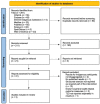The Effect of Community-Based Exercise on Health Outcomes for Indigenous Peoples with Type 2 Diabetes: A Systematic Review
- PMID: 38541290
- PMCID: PMC10970571
- DOI: 10.3390/ijerph21030290
The Effect of Community-Based Exercise on Health Outcomes for Indigenous Peoples with Type 2 Diabetes: A Systematic Review
Abstract
Indigenous peoples globally experience a high burden of type 2 diabetes in comparison to non-Indigenous peoples. While community-based exercise interventions designed for type 2 diabetes (T2D) management have garnered success in non-Indigenous populations, they likely require adjustments to meet the needs of Indigenous people. This systematic review aims to determine if health outcomes in Indigenous peoples with T2D could be improved by community-based exercise programmes and the features of those programmes that best meet their needs. The CINAHL, Embase, Informit Indigenous Collection, Medline, PubMed, Scopus, SportDiscus, and Web of Science databases have been searched to identify peer-reviewed literature with original outcome data that report on the health effects of community-based exercise interventions for the management of T2D among Indigenous peoples. The Mixed Methods Appraisal Tool and Indigenous Community Engagement Tool were implemented to assess methodological quality. Three moderate-to-high-quality studies were selected for review, including participants of Polynesian or Native American Zuni Indian descent. Results indicated positive effects of group exercise on glycated haemoglobin (HbA1c), body mass index, body weight, total cholesterol, blood pressure, quality of life, and patient activation levels in high-adhering participants. This review concludes that community-based exercise interventions may improve health outcomes for Indigenous adults with T2D when conducted with strong community engagement.
Keywords: Indigenous; community-based; exercise; type 2 diabetes.
Conflict of interest statement
The authors declare that there is no conflict of interest.
Figures
Similar articles
-
Psychological interventions to improve self-management of type 1 and type 2 diabetes: a systematic review.Health Technol Assess. 2020 Jun;24(28):1-232. doi: 10.3310/hta24280. Health Technol Assess. 2020. PMID: 32568666 Free PMC article.
-
Beyond the black stump: rapid reviews of health research issues affecting regional, rural and remote Australia.Med J Aust. 2020 Dec;213 Suppl 11:S3-S32.e1. doi: 10.5694/mja2.50881. Med J Aust. 2020. PMID: 33314144
-
Traditional knowledge-based lifestyle interventions in the prevention of obesity and type 2 diabetes in Indigenous children in Canada: a systematic review protocol.Syst Rev. 2019 Mar 6;8(1):69. doi: 10.1186/s13643-019-0961-4. Syst Rev. 2019. PMID: 30841917 Free PMC article.
-
Effective primary care management of type 2 diabetes for indigenous populations: A systematic review.PLoS One. 2022 Nov 10;17(11):e0276396. doi: 10.1371/journal.pone.0276396. eCollection 2022. PLoS One. 2022. PMID: 36355789 Free PMC article.
-
Promoting and supporting self-management for adults living in the community with physical chronic illness: A systematic review of the effectiveness and meaningfulness of the patient-practitioner encounter.JBI Libr Syst Rev. 2009;7(13):492-582. doi: 10.11124/01938924-200907130-00001. JBI Libr Syst Rev. 2009. PMID: 27819974
References
-
- Axelsson P., Kukutai T., Kippen R. The field of Indigenous health and the role of colonisation and history. J. Popul. Res. 2016;33:1–7. doi: 10.1007/s12546-016-9163-2. - DOI
-
- Burrow S., Ride K. Review of diabetes among Aboriginal and Torres Strait Islander people. [(accessed on 27 October 2023)];Aust. Indig. Health. 2016 Available online: https://nla.gov.au/nla.obj-279724722/view.
-
- Czyzewski K. Colonialism as a Broader Social Determinant of Health. Int. Indig. Policy J. 2011;2 doi: 10.18584/iipj.2011.2.1.5. - DOI
Publication types
MeSH terms
LinkOut - more resources
Full Text Sources
Medical


